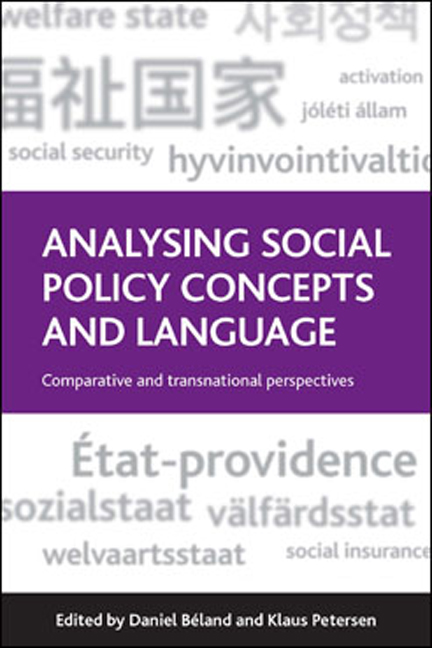Book contents
- Frontmatter
- Contents
- List of figures and tables
- Acknowledgement
- Notes on contributors
- Introduction: social policy concepts and language
- one Social policy language in Denmark and Sweden
- two The changing language of social policy in Hungary and Polan
- three Languages of ‘social policy’ at ‘the EU level’
- four The OECD's search for a new social policy language: from welfare state to active society
- five The discursive power of international organisations: social policy language and concepts in the World Bank and the International Monetary Fund
- six Original and imitated or elusive and limited? Towards a genealogy of the welfare state idea in Britain
- seven Social policy concepts and language in France
- eight The language of social politics in Finland
- nine Germany: constructing the ‘win-win’ society
- ten Conceptual development of welfare and social policy in Japan
- eleven Transition to the ‘universal’ welfare state: the changing meaning of ‘welfare state’ in Korea
- twelve The Dutch ‘caring state’
- thirteen Panacea, problem or perish: social policy language in New Zealand
- fourteen Evolving social policy languages in Spain: what did democracy and EU membership change?
- fifteen Social policy language in the United States
- Conclusion: comparative perspectives on social policy language
- Index
nine - Germany: constructing the ‘win-win’ society
Published online by Cambridge University Press: 04 March 2022
- Frontmatter
- Contents
- List of figures and tables
- Acknowledgement
- Notes on contributors
- Introduction: social policy concepts and language
- one Social policy language in Denmark and Sweden
- two The changing language of social policy in Hungary and Polan
- three Languages of ‘social policy’ at ‘the EU level’
- four The OECD's search for a new social policy language: from welfare state to active society
- five The discursive power of international organisations: social policy language and concepts in the World Bank and the International Monetary Fund
- six Original and imitated or elusive and limited? Towards a genealogy of the welfare state idea in Britain
- seven Social policy concepts and language in France
- eight The language of social politics in Finland
- nine Germany: constructing the ‘win-win’ society
- ten Conceptual development of welfare and social policy in Japan
- eleven Transition to the ‘universal’ welfare state: the changing meaning of ‘welfare state’ in Korea
- twelve The Dutch ‘caring state’
- thirteen Panacea, problem or perish: social policy language in New Zealand
- fourteen Evolving social policy languages in Spain: what did democracy and EU membership change?
- fifteen Social policy language in the United States
- Conclusion: comparative perspectives on social policy language
- Index
Summary
Concepts have a life, and like most lives, they are not linear. (Petersen and Petersen 2013: 48)
Ending class conflict (as we know it): a brief history of conceptual regimes
Concepts have a nonlinear life: What holds for social policy language in general and for the politico-academic concept of the welfare state in particular should be true for the history of ‘welfare semantics’ (Lessenich, 2003a) in Germany. With Germany having passed through extremely different political regimes throughout the 20th century – imperial authoritarianism, contested democracy, fascist Volksgemeinschaft, liberal/communist double stateness, ‘post-national’ reunification – it is hardly a surprise that German social policy language likewise changed substantially from Bismarck's to Merkel's times. The German welfare language community has moved away from addressing the ‘tough’ problem(s) of the industrial working class (Arbeiterfrage) in the late 19th century and instead headed for the ‘soft’ issue of activating human capital for the (alleged) knowledge society at the beginning of the 21st. However, with some analytical distance, it may well be said that across this whole period – its eventful history of political transformations notwithstanding – the German welfare discourse revolved around a remarkably stable centreline: the (re)conciliation of economy and society by means of the Sozialstaat.
Concepts in the field of social policy are ‘essentially contested concepts’ (see Collier et al, 2006) – probably even more so than those structuring social reality in other policy domains. The politics of social policy are largely about the continuous political business of ‘drawing and redrawing … the contested boundaries of state action’ (Beland, 2011: 2; see also Blyth, 1997), that is, of public intervention into private matters. In a way, and to an extent that seems to be quite exceptional when compared to other national trajectories of social policy language, social policy's conceptual history in Germany is a history of theorising and operationalising state–society relations. From its beginnings in the 1840s up to the current state of affairs, German welfare semantics reflect the struggle between statist and civil conceptions of social order.
- Type
- Chapter
- Information
- Analysing Social Policy Concepts and LanguageComparative and Transnational Perspectives, pp. 177 - 192Publisher: Bristol University PressPrint publication year: 2014

